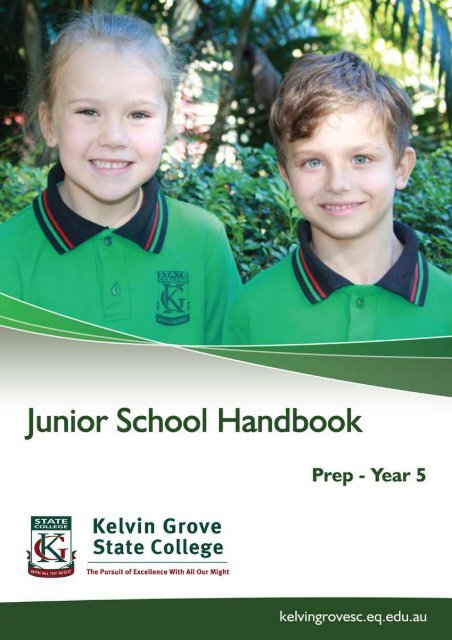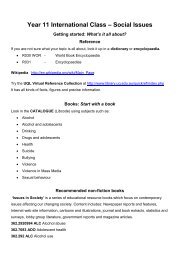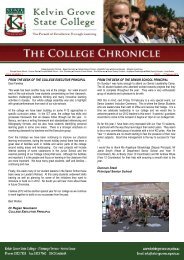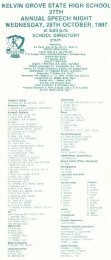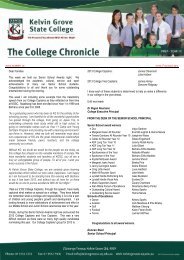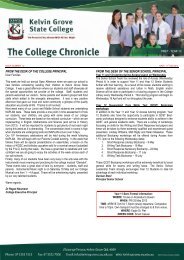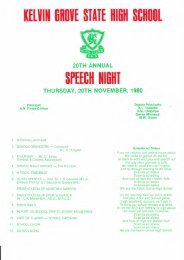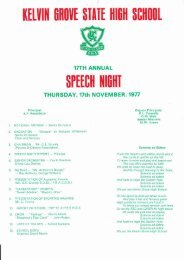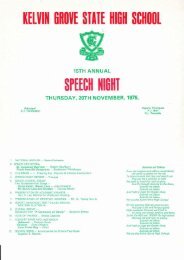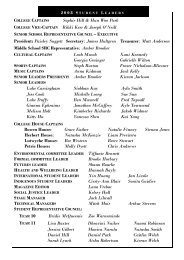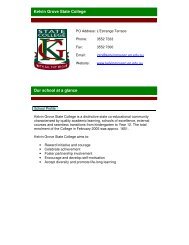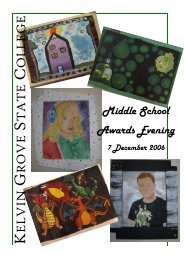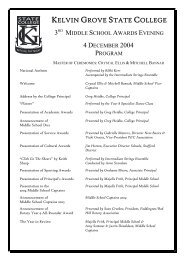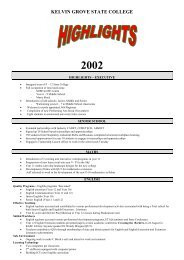GENERAL INFORMATION
Junior School handbook - Kelvin Grove State College - Education ...
Junior School handbook - Kelvin Grove State College - Education ...
You also want an ePaper? Increase the reach of your titles
YUMPU automatically turns print PDFs into web optimized ePapers that Google loves.
<strong>GENERAL</strong> <strong>INFORMATION</strong><br />
College Website<br />
www.kelvingrovesc.eq.edu.au<br />
College Executive Team<br />
College Executive Principal<br />
Principal: Junior School<br />
Principal: Middle School<br />
Principal: Senior School<br />
College Deputy Principal<br />
College Business Services Manager<br />
Junior School<br />
Deputy Principal<br />
Head of Department<br />
Diverse Learning Coordinator<br />
Dr Regan Neumann<br />
Damien Greig<br />
Michael Loftus<br />
Duncan Steel<br />
Liz Foster<br />
Paul Hillier<br />
Julie Taylor<br />
Angelique Strawbridge<br />
Peter Blakeney<br />
Chris Tuck<br />
Junior School Mailing Address<br />
L’Estrange Terrace<br />
Kelvin Grove QLD 4059<br />
Junior School Contact Details<br />
Telephone: 35527444<br />
Fax: 35527400<br />
Student Absences: 35527460<br />
Student Absences Email: js.absence@kelvingovesc.eq.edu.au<br />
Junior School Enrolments Officer<br />
Jodie Hilton<br />
Telephone: 3552 7444<br />
Email: jhilt28@eq.edu.au<br />
Outside School Hours Care (OSHC)<br />
Telephone: 33526007<br />
E-mail kgoshc@bigpond.com
OUR COLLEGE<br />
Kelvin Grove State College commenced operation in 2002. The College is the result of the merging of<br />
Kelvin Grove State School with Kelvin Grove State High School.<br />
Our three-tiered College caters for Preparatory to Year 12 students – providing a seamless transition:<br />
Junior School Prep – Year 5<br />
Middle School Years 6 – 9<br />
Senior School Years 10 – 12<br />
Our College Mission<br />
Kelvin Grove State College is a unique, committed and collaborative P-12 educational institution that seeks<br />
to provide a supportive and engaging learning environment. Our uniqueness is characterised by:<br />
• Intellectual rigour across core and elective disciplines<br />
• Multiple learning and career pathways<br />
• Schools of Excellence, accelerated learning pathways and extension courses<br />
• Quality partnerships with our community, industry groups and tertiary institutions<br />
• Cohesion and continuity across early, middle and senior phases of learning and development<br />
• A community enriched through multi-culturalism, and invigorated through diversity by valuing both<br />
local cultures and international students<br />
• Genuine working relationships within and ethos of generosity of spirit towards all.<br />
Our College Motto<br />
Our College motto is With All Thy Might.<br />
Our College Vision<br />
Our College vision is The Pursuit of Excellence With All Our Might.<br />
Our College Values
The Junior School Curriculum<br />
Australian Curriculum<br />
The Australian Curriculum (AC) has been implemented in the Junior School since 2011 in the areas of<br />
English, Maths and Science. History was introduced in 2012 with Geography in 2014.<br />
Full details of the curriculum are available on the website http://www.australiancurriculum.edu.au/<br />
Active Citizenship Education (ACE Program)<br />
Active Citizenship Education (ACE) is a program unique to Kelvin Grove State College which is<br />
implemented Prep through to Year 12.<br />
The program focuses on living in a world that provides for the current generation, as well as enhancing the<br />
resources for future generations. It acknowledges the intrinsic value of living things and cultural practices,<br />
and seeks to sustain both long term. It is about looking at how humans can function on the Earth<br />
interdependently, in a way that doesn’t deplete either our natural resources or our capacity to be productive<br />
in the future. Sustainability involves taking responsibility for our actions, and thinking about how they might<br />
impact on our world, in the present and the future, as well as reflecting on how human actions have made<br />
an impact in the past.<br />
The ACE Program integrates goals of conservation, social justice, cultural diversity, appropriate<br />
development and democracy with a mission of personal and social change. The four areas that<br />
sustainability education encompasses are environmental sustainability, social sustainability, economic<br />
sustainability and political sustainability. Environmental conservation sees the earth as a living body that<br />
supports life and requires nurturing in order to continue to be a vital resource for humans. Social<br />
sustainability recognises that humans need to live in functional communities together to prosper, and that<br />
social cohesion impacts sustainable living. Economic sustainability is vital in a free market society that is<br />
largely unregulated, and this component addresses how economics influence the social, environmental and<br />
political aspects of sustainable living. Political sustainability addresses decision making, governance and<br />
power at all levels of society, and reflects on best practices for achieving sustainable goals.<br />
Assessment & Reporting<br />
Student Assessment<br />
Students' work is assessed throughout the semester by a range of techniques and instruments - including<br />
observation, assignments, conferences, self-evaluation, testing and through performances and<br />
demonstrations at the end of units of work. Parents are invited to view Year level overviews (Prep through to<br />
Year 12) which are posted on our College website www.kelvingrovesc.eq.edu.au<br />
Reporting To Parents<br />
Written reports are sent home in June and December. Parent interviews are held at the end of first term and<br />
then again in term 3.<br />
Parents or teachers may also request an appointment for interview at any time.<br />
All students in Years 3, 5, 7 and 9 participate in the NAPLAN tests in May. Individual Student Reports from<br />
NAPLAN usually arrive at the end of Term 3.
The Arts<br />
The teaching of The Arts (Visual Arts, Dance, Drama and Media) is fully integrated into our curriculum.<br />
In Visual Arts, students are exposed to: painting and drawing, textiles, construction, modelling and<br />
printmaking. Our Junior School has well equipped art resource areas. In 2014/5 we have a Teaching Artist<br />
implementing the Visual Arts program which classes will attend for 1 hour per fortnight. The College holds a<br />
Faces @ KG Art Exhibition at QUT’s Creative Industries in November where selected pieces of<br />
portraiture from Prep to Year 11 are displayed during a week-long exhibition.<br />
Dance, drama and media provide great outlets for students to express their creative talents and each year<br />
level integrates these forms of expression into their units of work.<br />
Our classroom music program helps to develop children’s awareness of music, response to music and the<br />
development of students’ capacity for self-expression. Learning is through a variety of activities where the<br />
children are taught the basic skills of music - beat, rhythm, pitch, singing, movement, listening, creating and<br />
playing. This is supported by the ukulele and percussion programme which is incorporated into the student’s<br />
weekly music lesson starting from Prep. We also incorporate an extensive range of instruments to enable<br />
hands on musical experience.<br />
The recorder program starts from Year 3. A guitar program (both acoustic and electric) is also incorporated<br />
as part of the weekly lesson.<br />
From Year 1, students are taught the skills of composition, notation and recording of music on CDs in the<br />
Music Computer Pod. Students become familiar with programs such as Super Looper leading to Sibelius<br />
software.<br />
Our music program is delivered by specialist music teachers in weekly lessons from Prep to Year 5. Weekly<br />
jam sessions occur during lunchtime for interested students.<br />
College Instrumental Music Program<br />
The College’s Instrumental Music teachers of brass, woodwind, percussion and strings teach selected pupils<br />
from Years 3 -12. Students can begin to learn a stringed instrument from Year 3 and brass, woodwind and<br />
percussion instruments from Year 5.<br />
In Term 4 of each year, notices are given to interested students in Years 2, 3 and 4. The Music Specialist<br />
and Instrumental Music teachers conduct aptitude tests and offers are made to selected students to join the<br />
program for the following year.<br />
In Term 1 of each year, newly enrolled students are auditioned and final arrangements are made regarding<br />
school instruments and tuition. No new beginner applicants will be taken after week 2. All beginners attend a<br />
2 day intensive Kickstart program in Term1 of school at the College.<br />
Notification is given to parents if a departmental instrument is available. Beginning students are given first<br />
choice of any available instruments and pay an annual Instrument Hire Charge.<br />
Students also pay an Instrumental Music Charge per year (there are family concessions for a second child<br />
and a flat fee for a family of three or more) to cover the many costs involved with instrumental music, such as<br />
the buying of new music for ensembles, music stands and covers, competition fees, and specific projects<br />
developed by the Music Supporter’s Group.<br />
All fees are payable to the Junior School office before tuition and instruments are provided.
Information & Communication Technology (ICT)<br />
ICT lessons are integrated in our Junior School curriculum programs as a way to learn, research, develop<br />
and present new ideas. The Junior School has several pods of laptops which are utilised to support<br />
curriculum programs in classrooms. In addition there is a full set of desktop computers in our airconditioned<br />
library.<br />
Students operate on a standard Windows environment and are taught skills in word processing, internet<br />
research, email, PowerPoint, web page development, scanner operation, digital camera, flash animation<br />
and CD burner use.<br />
Students gain access to the internet after signing an Internet Contract, specifying responsibilities for<br />
internet users. All classrooms including specialists’ have an Interactive Whiteboard.<br />
Physical Education<br />
Our PE specialist offers a comprehensive program incorporating a much broader range of activities than<br />
offered at most schools. Our PE Program aims to develop the essential skills of physical fitness, ball skills,<br />
athletics, track and field events, games, dance, gymnastics and swimming.<br />
Additionally, the Junior School Program incorporates our College’s Schools of Excellence - Golf, Dance,<br />
Soccer and Tennis.<br />
Languages - Italian<br />
Italian is taught at the Junior School from Years 2 - 5. This is well beyond Education Queensland’s<br />
requirements. The program extends into the Middle and Senior Schools.<br />
Our program follows a comprehensive, sequential program which aims to teach a variety of skills, including:<br />
• Communication in Italian<br />
• Linguistic awareness<br />
• Socio-cultural awareness<br />
• General knowledge<br />
Italian Carnevale is celebrated at the end of Term 1 providing an annual highlight for the school calendar and<br />
includes all our students from Prep-Year 5.<br />
Library<br />
Junior School students receive weekly lessons from the Teacher Librarian. These lessons are<br />
developed in collaboration with the classroom teacher and are an important part of our Literacy<br />
Program.<br />
Students are encouraged to borrow books and to use the reference material available. Prep, Year 1 and 2<br />
may borrow one book per week and Years 3-5 may borrow two books for two weeks. All students require a<br />
library bag for carrying their books to and from school. These bags are available from the College Sub-<br />
Shop.<br />
Religious Instruction<br />
Under Queensland Legislation Religious Instruction (RI) is taught by approved volunteers from any<br />
recognised faith groups who offer their services to a school.<br />
Currently at KGSC Junior School there are a number of volunteers from one provider who present RI<br />
based on mixed Christian faiths.<br />
Over the year, there are approximately 10 classes of 30 minutes each (total of 5 hours over the year).<br />
RI takes place in the school classroom during school hours.
At KGSC, each family is asked at enrolment to indicate:<br />
a. Their religion<br />
b. Whether they would like their child to attend RI<br />
Those parents who indicate on their enrolment form a religion that is offered (currently Christian) or<br />
indicate that they would like their child to attend RI are understood to have opted in to RI.<br />
Those parents who have indicated a religion that is not offered as an RI option, or have indicated that they<br />
would not like their child to attend RI are understood to have opted out.<br />
Parents can change their selection at any time by writing to the school.<br />
Children who attend and those who do not attend RI are managed in separate locations depending on<br />
numbers. Both groups are supervised by KGSC teaching staff. Children who do not attend RI undertake<br />
alternative planned activities.<br />
In order to maintain accurate records, a notice is sent to parents each year so that they can reconsider and<br />
update their choice about RI participation.<br />
More information is available at:<br />
http://ppr.det.qld.gov.au/education/learning/Pages/Religious-Instruction-in-School-Hours.aspx<br />
Trackdance<br />
Trackdance is an initiative of the Queensland Dance School of Excellence (QDSE) a partnership between<br />
Kelvin Grove State College and the Queensland Ballet.<br />
Trackdance is available, via audition, to students in Years 3, 4 and 5. They are taught<br />
various forms of dance by the QDSE teachers in two of the College’s five dance studios.<br />
Lessons are conducted on Friday afternoons 11.15-1.00pm (Years 4 and 5) and 1.30-<br />
3.00pm (Year 3). Participants in the program perform an end of year concert along with<br />
the Mid Trackdance and QDSE students.<br />
Diverse Learners<br />
Like all schools, we have a range of diverse learners. Teachers cater to the needs of our range of students by<br />
implementing differentiation strategies. In the Junior School, teachers and students are supported by the<br />
expertise of our Diverse Learning Coordinator and by the Diverse Learners’ Committee.<br />
Students with learning difficulties are brought to the attention of the Diverse Learning Committee via referral<br />
by the classroom teacher. This committee meets fortnightly and is instrumental in deciding how best to<br />
support these children as well as continually monitoring and reviewing the effectiveness of the support<br />
programs.<br />
Students who are identified as “Gifted” are also supported by the Diverse Learning Coordinator as well as our<br />
team of Gifted Education Mentors (GEMs).<br />
English as an Additional Language / Dialect (EAL/D) Support<br />
A fulltime EAL/D teacher and five teacher aides support our Junior School students whose first language is<br />
not English. The major role of the EAL/D support staff is to enhance the children’s English language<br />
abilities while offering assistance and support to them and their families. The amount of EAL/D time<br />
available is based on Education Queensland’s English proficiency levels. To be eligible for EAL/D support<br />
your child’s passport would need to be sighted and an application made to the EAL/D Co-ordinator.
House System<br />
Students are allocated to a House for the purpose of intra-school competitions. The houses are chosen by<br />
the student’s surname. The four Houses are<br />
(A-D) PETRIE (Orange and Black).<br />
(E-K) BOWEN (Blue and Gold)<br />
(L-Q) HERBERT (Red and White)<br />
(R-Z) LUTWYCHE (Purple and White).<br />
Junior School Pat Reid Challenge Cup<br />
2011 saw the introduction of the Junior School Challenge Cup. The cup is awarded to the House with the<br />
most points at the end of the year.<br />
Points are accumulated from the following competitions:<br />
Sports Day - All students participate in a tabloid style programme with the focus on maximum participation<br />
and fun. Parents are encouraged to attend on the day. Students in the 9 and 10 years age groups compete<br />
in High Jump, Long Jump and Shot Put in Physical education classes. The 200m and 800m take place on<br />
the college oval the morning of the third last Wednesday of term. Students who win and reach the qualifying<br />
levels in sprints and field events may represent the College at District Athletics.<br />
Sports Day for Years 1-5 is usually held on the second last Thursday of Term 2. Prep sports fun morning is<br />
the second last Monday of Term 2 9:00 -11:00am.<br />
Soccer - Students in Years 4-5 are able to participate in an inter-house soccer tournament, which is played<br />
during the lunch break in Term 2 and 3 and is organised by staff and the student house captains.<br />
Knock Out Ball - Students in years 3-5 are able to participate in an inter-house modified game of<br />
Newcombe, which is played during the lunch break in term 3 and is organised by staff and student house<br />
captains.<br />
Italian speaking - Students learn a poem or a song in Italian classes and are then given the opportunity to<br />
compete in a performance. All students who participate in class gain point for their house. Six students<br />
are chosen by the Italian teacher to compete at assembly to gain extra points.<br />
Library borrowing - Students from each year level earn points for their house for the most books<br />
borrowed in terms one to three.<br />
Spelling bee - Each class completes a spelling list of 20 words. Points are awarded to the house<br />
according the number of correct spelling.<br />
Choir - Students from each of the four houses learn the same song and perform for judges at an<br />
Assembly.
Behaviour Management<br />
Kelvin Grove State College aims to provide an environment, in which students feel they belong, are valued<br />
and are safe. To achieve this aim the College has developed a comprehensive behaviour management plan.<br />
The College’s full Responsible Behaviour Plan is available on the College website, but below are some<br />
relevant excerpts:<br />
Rationale<br />
The goal of our Responsible Behaviour Plan is to empower all members of the College community to<br />
conduct themselves in appropriate ways in all aspects of life. We strive to assist students to become<br />
socially responsible adults with a sense of discipline and self esteem.<br />
College Beliefs about Behaviour and Learning<br />
o<br />
o<br />
o<br />
o<br />
o<br />
o<br />
o<br />
o<br />
o<br />
o<br />
o<br />
o<br />
o<br />
o<br />
o<br />
Students and teachers have the right to work to their potential, free from disruption, abuse or<br />
harassment.<br />
Positive relationships between teachers and students and a positive classroom environment are<br />
essential for good order and discipline, and for effective teaching and learning.<br />
Expectations of standards of behaviour are highlighted by school and classroom rules. Application of<br />
the rules, and the consequences of breaking any rule, should be consistently exercised.<br />
Everyone has the right to feel comfortable while they are at school.<br />
All members of the College community have the right to be safe and are valued i.e. free from verbal<br />
and/or physical harassment and/or threatening behaviour.<br />
Social and academic learning outcomes are maximised through quality practices in the areas of<br />
curriculum, interpersonal relationships and College organisations.<br />
Non-violent, non-coercive and non-discriminatory language and practices are defined, modelled and<br />
reinforced by all members of the College community.<br />
Suspension and exclusion procedures are considered only when other approaches have been<br />
exhausted or rejected.<br />
Students should treat all members of the College community with courtesy.<br />
All members of the College community are to be punctual.<br />
All students are required to be in class during timetabled sessions, unless appropriate procedures have<br />
been followed.<br />
Students must wear full College uniform neatly, as supplied by the SUB Shop.<br />
Respect for personal property, College property and that of others is required of all members of the<br />
College community.<br />
Students must not intentionally or unintentionally endanger the health or well being of others.<br />
Students’ behaviour in public and the wider community should reflect the College Code of Conduct:<br />
Our College School Rules<br />
• Be safe<br />
• Be responsible<br />
• Be respectful
Junior School Social Skills Programs<br />
The High 5 Strategy empowers students with steps to deal with conflict with other students.<br />
The five steps are:<br />
1. Ignore<br />
2. Walk away<br />
3. Be friendly<br />
4. Be firm<br />
5. Report / Get help<br />
These steps are modelled and reinforced with the students and they are encouraged to use them in the<br />
playground whenever they are faced with conflict. Posters showing the High 5 hand symbol are displayed<br />
throughout the school. Small High 5 brochures are also distributed to students.<br />
KidsMatter<br />
KidsMatter is a mental health and wellbeing framework for primary schools and is proven to make a<br />
positive difference to the lives of Australian children.<br />
In the Junior School we have an active team approach to using the Framework which provides the proven<br />
methods, tools and support to help our school work with parents and carers, health services and the wider<br />
community, to nurture happy, balanced kids.<br />
You Can Do It! Program<br />
Confidence<br />
The You Can Do It (YCDI) Program aims to develop young peoples’<br />
social and emotional capabilities:<br />
The YCDI program underpins our social and emotional learning at<br />
KGSC aligning with our College values.<br />
Resilience<br />
Getting<br />
Along<br />
You Can<br />
Do It!<br />
Organisation<br />
Persistence<br />
The language and principles are embedded in all that we do.<br />
Happiness<br />
Trusting relationships<br />
Integrity and Honesty<br />
Think and act ethically<br />
Kelvin Grove State College Values<br />
Courage and Resilience<br />
Refuse to give in to doubt and fear<br />
Respect<br />
To believe in the inherent worth of each<br />
person<br />
Responsibility<br />
Recognise the connections among<br />
personal, social and environmental<br />
wellbeing<br />
Valuing Diversity<br />
Recognise the common humanity of all<br />
peoples<br />
Creative and Critical Thinking<br />
Engage in lifelong learning<br />
Five core social and<br />
emotional<br />
capabilities<br />
Confidence<br />
Persistence<br />
Organisation<br />
Getting Along<br />
Resilience<br />
Early Years<br />
Positive Habits<br />
of Mind<br />
Accepting myself<br />
Taking risks<br />
Being independent<br />
I Can Do It<br />
Giving effort<br />
Working tough<br />
Setting goals<br />
Planning my time<br />
Being tolerant of<br />
others<br />
Thinking first<br />
Playing by the rules<br />
Social responsibility<br />
Calm it down<br />
I’m in control<br />
Think first<br />
It’s okay to make a<br />
mistake
Daily Procedures in the Junior School<br />
Junior School Daily Routine<br />
8:30am<br />
8:45am<br />
8:55am<br />
11:00am<br />
11:15am<br />
11:45am<br />
1:30pm<br />
1:40pm<br />
2:00pm<br />
3:00pm<br />
Students enter school building & place bags on bag racks.<br />
Students proceed to their classrooms / line up<br />
Roll called and marked - lessons commence<br />
Lunch Time<br />
Play Time<br />
Students return to class<br />
Afternoon Tea Break<br />
Play Time<br />
Lessons commence<br />
Students dismissed<br />
Before School Procedures<br />
1. If students arrive before the first bell (8:30am) they are to sit quietly under the Tuckshop area.<br />
2. Once the 8:30am bell rings, students must place their bags on the bag racks then return downstairs<br />
unless a teacher has given them permission to enter the classroom.<br />
3. Students are only allowed to play after the 8:30am bell and after they have taken up their bags.<br />
4. Students are not permitted on the playgrounds / oval before school.<br />
5. The only play equipment permitted before school is that which is distributed by the staff on duty.<br />
After School Procedures<br />
1. Students are to proceed directly to their place of pick up and are to sit and wait quietly (inside the<br />
school grounds) or to Kelvin Grove Outside School Hours Care (OSHC)<br />
2. Children need to sit on the benches under the car pick-up shelter and wait quietly for their parents<br />
at the Look Out zone.<br />
3. Students must exit all school buildings (hallways, classrooms) immediately at 3pm.<br />
4. Students are NOT permitted to play in the school grounds whilst waiting to be collected.<br />
Hallway Procedures<br />
1. Students are not permitted in the corridors/hallways during breaks without the permission of a<br />
teacher.<br />
2. Bags and their contents must be on the bag racks at all times.<br />
3. Students must exit the school buildings as quickly as possible at the start of all breaks.<br />
4. Students must walk and keep to the left at all times in the hallways and on the steps.<br />
5. Students must give way to adults at all times.<br />
6. During class time, students must walk quickly and quietly along the corridors so that others are not<br />
disturbed.<br />
7. Students must use the stairs closest to their classroom to exit the building.<br />
8. Sports equipment is to be used only in the play areas.<br />
9. Food and drink is to be opened and consumed whilst seated downstairs.<br />
10. Students are to wait quietly for their teacher in designated areas at the end of each break.
Junior School General Information<br />
Absence from School<br />
If a student is absent from school, a note explaining the reason for absence is<br />
required when the child returns to school. We also ask that parents advise of<br />
the absence by contacting the school via phone on 3552 7460 which has a 24<br />
hour answering machine or via email.<br />
In the case where no explanation is received concerning a child's absence from<br />
school the official school roll will show an unauthorised absence. This will be<br />
recorded on their written semester reports. This is necessary to prevent<br />
truancy. Parents will be contacted officially if a pattern of unauthorised<br />
absences or truancy is detected outlining parents’ legal responsibilities in line with recent Education Act<br />
legislation.<br />
Access to Students<br />
Should you require access to your child/children during school hours, it is policy that all enquiries are made<br />
through the office. This procedure is necessary to ensure the safety of our pupils at all times. All parents<br />
must report and sign in and out at the Junior School office.<br />
Ambulance Cover<br />
All Queensland schools are covered by the Ambulance Policy which provides free ambulance service<br />
throughout Queensland. Parents are advised to always ensure their contact details are updated at the<br />
office.<br />
Arrival at School<br />
Students should not arrive at school before 8.30am. Parents who, through work commitments, are unable to<br />
arrange for alternative care before or after school off-site can avail themselves of OSHC, a user-pays service<br />
provided by the P&C.<br />
If arriving after 9.00am or collecting students prior to 3:00pm, ALL parents are required to sign children in/out<br />
at the Junior School office. Unaccompanied children arriving after 9.00am must also report to the Junior<br />
School to record time of arrival. Teachers will monitor for patterns of consistent lateness. Parents will be<br />
contacted if more than 5 “lates” are recorded in a term. Please discuss any issues with the class teacher if<br />
problems arise. Students who consistently arrive late (after 9.00am) cause disruption to the class routine and<br />
their own learning.<br />
Bus Services<br />
Our school is serviced well by public transport. The Brisbane City Council can assist you with any enquires re<br />
timetables. Contact 131230 for bus information.<br />
The College Chronicle<br />
The College Chronicle is the College’s weekly newsletter. An electronic version can be viewed on the<br />
College’s website. A Junior School Newsletter is also distributed electronically to parents with specific news<br />
items and weekly awards.<br />
Crossing Supervisors<br />
There are four pedestrian crossing supervisors provided by the Transport Department on patrol every<br />
morning, from 8:00 – 9:00am and afternoons from 2.50 – 3.20pm.
Please use these crossings when picking up your child/ren to demonstrate safe road crossing practices.<br />
Encourage your child/ren to utilise the crossing by NEVER calling for them to cross unsafely to where you<br />
are parked/standing across the road.<br />
Emergency Evacuation or Lockdown Procedures<br />
Emergency procedures and Lock Down procedures are practised once a term. In the event of an real<br />
emergency or danger occurring close to 3.00pm (e.g. severe storm, hailstorm, civil disturbance), the<br />
children will remain inside the classroom under supervision of the teacher until the danger has passed.<br />
Parents are able to come to the room to collect their child if they wish.<br />
Enrolments<br />
Students entering Prep must turn five years of age by the 30 June in their Prep year. Documentary<br />
evidence of date of birth is required for all pupils to confirm enrolment. All enrolments require an<br />
interview with the Junior School Principal. Appointments can be made through the office. Kelvin Grove State<br />
College has an approved Enrolment Management Plan, an outline of which is available from the office and on<br />
our website. Please see KGSC Prep Handbook for more information.<br />
Excursions<br />
Excursions are arranged for their educational value throughout the year. It is important that each child<br />
participate if at all possible, as follow-up lessons will be held after the excursion.<br />
Illness / Accident<br />
School staff will contact parents if a child becomes ill or is involved in an accident. Should this be impossible,<br />
we shall take whatever further action is required for the child's welfare. It is imperative that parents provide<br />
current contact phone numbers for emergencies or illness to the office.<br />
Infectious Diseases – See Exclusion Table (Appendix A)<br />
The table (Appendix A) outlines the recommended exclusion from school attendance of pupils suffering from<br />
certain infectious diseases, or living in homes where infectious diseases exist. It is important for our school<br />
community that parents abide by these exclusions and alert the school when necessary.<br />
Due to our proximity to the Royal Children’s’ Hospital at times we have students in our school whose siblings<br />
are in hospital with serious illnesses and who require notification should their sibling be exposed to serious<br />
conditions. Please let the office staff know should your child become ill with anything on the table.<br />
International Students<br />
International students who enter schools in Queensland may be admitted under different conditions.<br />
Consequently, all international students must contact Education Queensland International, Telephone<br />
32246958 before enrolling at this school.<br />
Junior School Assembly<br />
Junior School Assembly is held every Friday at 9.00 am in the Junior School Hall. The assemblies are run by<br />
our Year 5 students. You are most welcome to attend. Awards for conduct, participation in class and many<br />
other aspects of improvement and consistent efforts are handed out at these times. The weekly awards are<br />
mentioned each week in the Junior School Newsletter.<br />
Leaving School Grounds<br />
Once students arrive at school they are not allowed to leave the school grounds, unless accompanied by<br />
a parent. Parents are required to collect children from the classroom for appointments during the school day<br />
after they have presented to the office to sign the child out.
Lost Property<br />
Please make sure that all articles of clothing and personal school equipment are clearly marked with your<br />
child's name in bold writing. A lost property box is located under A Block and also in our Children’s Centre<br />
(OSHC).<br />
Medication at School<br />
As per Education QLD Policy:<br />
• All medication, (including all over-the-counter medication such as paracetamol and alternative<br />
medicines), must be handed into the office and be authorised by a medical practitioner before it can<br />
be administered to students.<br />
• Teachers are not to administer medications to students<br />
• Medication required for medical emergencies, such as for anaphylaxis, diabetes, epilepsy or<br />
asthma attack are to be accessible at all times by school staff and not stored in a locked cabinet.<br />
Money Collection<br />
Please ensure all money is in an envelope with the student’s name, class and what the money is for clearly<br />
marked. Please hand this into the office no later than 9.00am.<br />
Parking<br />
Car park facilities in the school grounds are for authorised staff ONLY. Parking permits are issued to<br />
staff and must be displayed in order to park on the grounds. The car park is never to be used as a drop off<br />
point.<br />
Pick up Zones<br />
2 minute zones: The 2 minute pick up zones are located at the front entrance to school in L’Estrange Tce<br />
and at the top of Tank St. No parking is allowed at any time and you must remain in the vehicle at all times.<br />
LOOK OUT! Road Safety Program: In order to increase the safety of our students, we have implemented<br />
a LOOK OUT! Road Safety Program at the L’Estrange pick-up area. A brochure outlining the procedure is<br />
available from administration. This volunteer based program was developed to manage traffic flow in a safe<br />
and orderly manner through our “Look Out” Zone. It facilitates the quick pick-up of children during<br />
congested peak school finishing times.<br />
Pre-service Teachers<br />
Pre-service teachers regularly visit our College from QUT for varying periods of time to gain practical<br />
experience in the classroom situation. They are supervised by the classroom teachers, Head of Curriculum<br />
and the Principal and add another dimension to the educational opportunities afforded to the students.<br />
Student Resource Fee<br />
The Kelvin Grove State College Student Resource Fees for 2015 are subject to a final approval in<br />
November, on approval we will issue all existing and prospective parents a full copy of the terms and<br />
conditions and our school fees, this schedule will also be available on the Kelvin Grove State College<br />
website.<br />
Student Representative Council (SRC) - Year 5 Leaders<br />
Elections are held in the final term of Year 4 for positions on the SRC. There is a strict election process<br />
which includes a written and oral component. This process is worked through with the students by their<br />
Year 4 teacher. Each student receives a SRC Leadership Booklet which clearly outlines the expectations<br />
and timelines.<br />
The Junior School Representatives Committee is made up of the following positions:<br />
• Junior School Captains<br />
• Junior School House Captains
• Junior School SRC - Class Representatives.<br />
.<br />
All SRC Members are expected to:<br />
1. Be an exemplary role model at all times, while at school and travelling to and from school.<br />
2. Wear their college uniform with pride each day.<br />
3. Demonstrate exemplary behaviour and diligence in and out of class.<br />
4. Demonstrate initiative in supporting peers, staff and administration.<br />
5. Assist college staff in ensuring the rules and values of the college are upheld.<br />
The SRC also instils the Kelvin Grove State College Values each week by visiting the classrooms and, in<br />
conjunction with the classroom teacher, further discusses the value that was addressed on the weekly<br />
assembly. The SRC meet every fortnight with the SRC Coordinator.<br />
Text books & Stationery Requirements<br />
At the end of each school year, all students receive a booklist outlining their text books and stationery<br />
requirements for the next school year. Orders may be made on-line by the provider - see Year Level Book<br />
List for details. A copy of this list is available from the school administration.<br />
Tuckshop<br />
Junior School students can order lunches every day via the on-line service link on our College website or<br />
https://tuckshop.schoolshoponline.net.au/kgsc99/index.aspx or by writing their name and order on a paper<br />
bag and enclosing the money. Students put the bag in the tuckshop box at the Junior School office window<br />
before 8:55am each day. A limited service is available from the Junior School tuckshop at lunch only -<br />
11.00am til 11.40am.<br />
Uniform<br />
Girls<br />
School Green Polo Shirt<br />
Black Rugby Knit Shorts<br />
Black Skirt / Skort<br />
Red Polar Fleece Zip Jacket<br />
Black KGSC Logo Full Brim Hat<br />
White Socks<br />
Boys<br />
School Green Polo Shirt<br />
Black Rugby Knit Shorts<br />
Red Polar Fleece Zip Jacket<br />
Black KGSC Logo Full Brim Hat<br />
White Socks<br />
Our Prep children wear a distinctive KGSC logo RED full brimmed hat.<br />
Visitors to our school<br />
ALL visitors to our school must sign in and out at our Junior School office. This includes classroom<br />
volunteers
Appendix A - Infectious Diseases – Exclusion Table<br />
RECOMMENDED MINIMUM PERIODS OF EXCLUSION FROM SCHOOL<br />
Condition Cases Contacts<br />
Chickenpox and Shingles<br />
Exclude until fully recovered or at least five days<br />
after the eruption first appeared. (Some<br />
remaining scabs are not a reason for continued<br />
exclusion).<br />
Conjunctivitis Exclude until discharge from eyes has stopped Not excluded<br />
Cytomegalovirus<br />
Exclusion not necessary<br />
Not excluded<br />
Infection<br />
Diarrhoea (campylobacter,<br />
cryptosporidium, giardia,<br />
rotavirus, salmonella,<br />
shigella, intestinal worms)<br />
Exclude until diarrhoea has stopped<br />
Not excluded<br />
Glandular fever<br />
Exclusion not necessary<br />
Not excluded<br />
(mononucleosis)<br />
Hand, Foot and Mouth Exclude until all blisters have dried<br />
Not excluded<br />
Disease<br />
Haemophilus influenza Exclude until medical certificate of recovery is Not excluded<br />
type b (Hib)<br />
received<br />
Headlice<br />
Exclude until day after proper treatment has Not excluded<br />
started<br />
Hepatitis A<br />
Exclude until medical certificate of recovery is Not excluded<br />
received, but not before seven days after the<br />
jaundice or illness started<br />
Hepatitis B Exclusion not necessary Not excluded<br />
Hepatitis C Exclusion not necessary Not excluded<br />
Herpes (“cold sores”) Exclude if child cannot comply with good hygiene<br />
practices while sores are weeping. (Sores<br />
should be covered with a dressing where<br />
possible)<br />
Not excluded<br />
Human immune<br />
deficiency virus infection<br />
(HIV/AIDS virus)<br />
Impetigo (“school sores”)<br />
Influenza and influenzalike<br />
illness<br />
Measles<br />
Meningitis (other than<br />
the meningococcal<br />
infection)<br />
Meningococcal infection<br />
Exclusion not necessary unless child has a<br />
secondary infection which requires exclusion in<br />
its own right<br />
Exclude until proper treatment has started.<br />
(Sores on exposed skin should be covered with<br />
a watertight dressing)<br />
Exclude until well<br />
Exclude for at least four days after rash has<br />
started or until a medical certificate of recovery is<br />
provided<br />
Exclude until well<br />
Exclude until carrier eradication antibiotic course<br />
is completed<br />
Exclude children with immune<br />
deficiencies (e.g. Leukaemia or<br />
chemotherapy), otherwise not<br />
excluded<br />
Not excluded<br />
Not excluded<br />
Not excluded<br />
Molluscum contagiosum Exclusion not necessary Not excluded<br />
Mumps<br />
Exclude for nine days or until swelling goes Not excluded<br />
down<br />
Parvovirus (erythema<br />
infectiosum or “Fifth<br />
Exclusion not necessary<br />
Not excluded<br />
Immunised children not excluded.<br />
Non-immunised contacts should<br />
be excluded until 14 days after the<br />
first day the rash appears in the<br />
last case. They may return to the<br />
school or centre if immunised<br />
within 72 hours of contact with the<br />
first case<br />
Not excluded<br />
Not excluded. Close contacts<br />
should take antibiotic (rifampicin).<br />
Public health authorities will<br />
advise
Condition Cases Contacts<br />
Disease”)<br />
Ringworm, Scabies,<br />
Pediculosis, Trachoma<br />
Rubella (German measles)<br />
Streptococcal infection<br />
(including scarlet fever)<br />
Typhoid Fever (including<br />
paratyphoid fever<br />
Whooping Cough<br />
(pertussis)<br />
Exclude until day after proper treatment started<br />
Exclude until fully recovered or for at least four<br />
days after the rash started<br />
Exclude until child has received antibiotic<br />
treatment for at least 24 hours and feels well<br />
Exclude until a medical certificate of recovery is<br />
received<br />
Exclude for 21 days from onset or until child has<br />
taken five days of a 10-day course of antibiotics<br />
(erythromycin)<br />
Not excluded<br />
Not excluded (Female staff of<br />
child-bearing age should check<br />
their immunity to rubella with their<br />
GP)<br />
Not excluded<br />
Not excluded unless advised by<br />
public health authority<br />
Exclude non-immunised<br />
household contacts aged less<br />
than seven years, and children<br />
who are in close contact who are<br />
either less than one year old or<br />
not fully immunised, for 14 days<br />
after they were last exposed to<br />
infection or until they have taken<br />
five days of a 10-day course of<br />
antibiotics (erythromycin). If<br />
necessary, contact your nearest<br />
public health unit for advice


